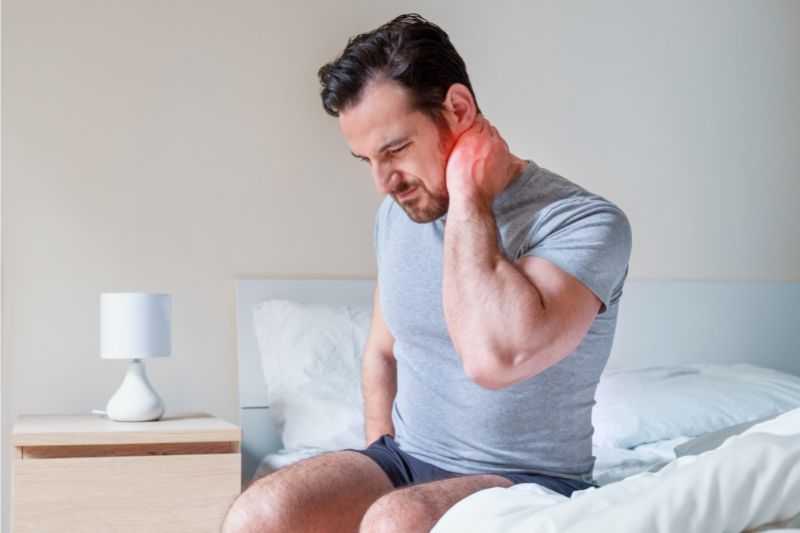Have you ever suffered from a sore neck when sleeping? There’s no doubt that a sore or stiff neck when sleeping can really hamper your ability to find the right sleeping position and get a good night’s sleep.
Still, with that being said, there are plenty of excellent ways you can prevent neck pain from taking over your life.
With this thought in mind, today, we’re looking at some of the main causes of neck pain after sleeping. We’ll also look at how you can get a good sleep at night and relieve neck stiffness. Hopefully, this will help ease your own discomfort when you wake up.
What is the Cause of a Sore or Stiff Neck When Sleeping?
There are numerous potential causes of neck pain. Some of the main reasons you may experience difficulty in the morning could include the following points.
Sleeping in the Wrong Position
Without a doubt, the most common reason for people to suffer from neck-related pain at night is sleeping in the wrong position. Sleeping in the wrong posture can place a lot of stress on your body.
This is common in people who sleep on the front of their body. This sleeping position can cause your neck to twist to the side all night. Maybe unsurprisingly, when you wake up the next morning, this can result in your neck and shoulders feeling stiff and twisted.
Damage or Stiffness From Injury
Sleeping with your neck in the wrong position can aggravate the stress if you have suffered an injury. During the day, pain serves to help us keep injuries safe. However, we tend to respond to pain less significantly when we sleep.
This means that it’s much easier to do further damage to your neck and head when asleep. In turn, this could result in you waking up with a sore shoulder, neck, or head more often.
As such, seeking treatment for pre-existing neck pain may help reduce the risk of doing further damage overnight.
Still, if your muscles are sore, treatment options can often feel limited. Don’t worry – we’ll look at how you can deal with pain for your head and neck in a little while.
Sudden Movement of your Neck
As a further cause, did you know that many people actually strain their necks and shoulders due to sudden movement in the night? When you move suddenly overnight, perhaps as a result of a bad dream, your muscles can get strained easily.
This can become very painful when waking up in the morning, and it’s not necessarily easy to counter this.
Fortunately, pain due to sudden movements at night is usually less severe than other causes. A gentle approach could hence help you cope with a sore neck due to sudden movements.
Using Unsupportive Pillows
As a final cause, did you know that the wrong type of pillow can actually have a surprising impact on your sleep quality? A poor-quality pillow is one that doesn’t support your neck.
This can result in your neck muscle groups having to stretch overnight. In turn, you may wake up with an incredibly stiff or sore neck if your pillow doesn’t give the support your body needs overnight.
Remember: the right pillow is hard to find. It can be too big or too small. Sometimes, your pillow may also be too soft or too hard. And, in some cases, you might actually sleep with too many pillows! In short: a single, suitable pillow is generally the best bet.
How to Prevent Neck Pain When Sleeping
Thus far, we’ve looked at some of the common causes of neck pain. Waking up with a stiff neck is never a pleasant experience. What’s more, it’s worth considering that a sore neck can’t simply be treated with pain-relieving gels. While these may help ease the pain in your neck after sleeping, they won’t actively
Focus On Your Sleeping Position
One of the first things you should do to prevent neck pain or a stiff neck is to focus on your sleeping position. As we said earlier, sleeping on your front will twist your neck. Sleeping in this position all night long will often leave your neck sore and painful.
As such, changing your sleeping position could significantly help support the muscles in your neck at night. If you can try to sleep on your side or your back, this may help a lot. Try to keep your spine straight, and don’t twist your neck when sleeping.
Even if you roll over in the night (we can’t control that!) it may help reduce the amount of time you spend sleeping on your front. The Better Health Channel also recommends avoiding back sleeping to help with upper back pain. So, it’s a win-win.
Invest in Higher Quality Pillows to Help Your Sore Neck
If you are struggling with neck pain when waking, you may need to purchase a pillow that directly supports your neck muscles. Indeed, many people have the wrong type of pillow. Unfortunately, this can be a massive risk factor for neck pain, causing unpleasant symptoms and stiffness.
What A Sleep recommends a memory foam pillow for neck pain. This should help take the pressure off your muscles and support your neck and upper spine better. This may also help improve your sleep quality overall, allowing you to wake up more refreshed.
A good mattress may also help support your spine when sleeping on your back. This can help your posture, potentially giving secondary benefits to your neck health and well-being.
How to Ease Discomfort Due to a Sore Neck when Sleeping
Now, we’ve looked at some of the most common causes of a sore neck and how you can prevent neck pain. But it’s still worth looking at how you can ease discomfort and pain in your neck after sleeping badly.
There are several options you could consider here. Most people will just reach for a muscle relaxing cream to ease their pain. However, this doesn’t actually combat the issue. In turn, you may do more damage to your neck after applying pain relief or ice to ease the discomfort. As such, this is where osteopathy comes in.
Osteopathy works by providing a thorough solution. Rather than only treating your neck pain, as advised by Medical News Today, they also provide manual techniques. These support your body’s natural systems. In turn, they may help you integrate better sleeping habits to reduce the strain on your neck. After all, waking up free of pain can be possible!
Gentle pressure and resistance are common techniques used as part of osteopathic treatment. These can gently ease pressure and stiffness in your neck. Plus, osteopath treatments can also help with many other posture-related concerns by providing a patient-centric approach. This may help reduce tension in your body as a whole.
In addition to osteopathy, we may recommend gently stretching to ease some of the stiffness in your neck. Some common neck exercises include gentle neck flexion from side to side and downwards. This gently stretches the muscles of your neck, which may help reduce your stiffness.
Can I Apply Temperature Compresses to Help?
If you’re struggling with pain and stiffness in your neck, there’s nothing wrong with applying temperature compresses. However, it is important to remember that these do not stop the issue.
Applying hot or cold packs to your neck may help depending on the cause of your stiffness. Gentle heat, such as from a hot water bottle, can help boost blood flow. This may, in turn, help reduce stiffness in your neck of the morning; it’s also effective before exercise.
Meanwhile, if you think your neck pain is caused by stiffness, a gently cooled compress may help reduce swelling and pain in your neck. This is most effective for sprains and strains, rather than general stiffness.
Pain relief isn’t the enemy. Temperature compresses can be effective if you need them, but try not to become too dependent on them, as they often don’t fix the issue. Always keep in mind that your neck may still be stiff, even if you can’t feel the pain. So, after applying pain relief creams, try to avoid sudden movements as much as possible. This can help reduce the risk of hurting your neck further.
Final Thoughts
Suffering from a sore neck after sleeping can be incredibly uncomfortable. However, if your neck muscles are strained or tight after a bad sleep, don’t worry – there are ways to combat a bad head and neck to help.
Remember: pain and stiffness don’t have to be an inescapable side effect of sleeping. So, you shouldn’t have to reach for pain relief just to get through the night.
Fortunately, osteopathy can be an excellent way to combat muscle strain in your neck. This can help you go to bed confident going forwards. So, contact our experts at MOSIC today to learn more about your potential options. After all, a sore neck when sleeping isn’t inevitable – and osteo treatment may help.




